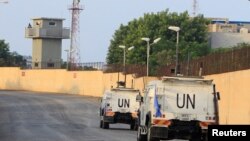Twelve United Nations personnel and three civilian staff members were killed in the line of duty in 2020, bringing the total number of deaths over the last decade to 440, according to findings of the Standing Committee for the Security and Independence of the International Civil Service of the United Nations Staff Union.
In a press release Monday, the organization said the deliberate killings involved the use of improvised explosive devices and other weapons, targeted assassinations and suicide attacks.
“We learn time and time again of the many colleagues serving around the world in the most dangerous places who have made the ultimate sacrifice for the United Nations flag,” said Patricia Nemeth, president of the U.N. Staff Union.
Four of those killed were from Burundi, and three were from Chad. Three other peacekeepers who died were Egyptian citizens, one Indonesian and a Rwandan. The civilians killed were from the Central African Republic, Myanmar and Syria.
The organization said the Indonesian casualty was serving with the United Nations Stabilization Mission in the Democratic Republic of the Congo (MONUSCO) and died in an armed ambush.
In Syria, armed violence led to the death of a science teacher working for the United Nations Relief and Works Agency for Palestine Refugees in the Near East (UNRWA), while a staff driver for the World Health Organization (WHO) in Myanmar was killed in an attack while delivering COVID-19 samples.
'Depth of sacrifice'
Over the years, the U.N. has recorded numerous deaths of its staff in the field who were trying to ease the burden of people living in some of the most troublesome parts of the world.
The highest number of deaths occurred in 2017 with 71 killings, followed closely with 61 personnel deaths in 2014. While the killings in 2020 pale against the 2019 total of 28 deaths, Nemeth said the deaths are sacrifices that are hard to come to terms with.
“Even though we may not be directly affected by the wars raging around the globe, some of us may not fully comprehend the depth of sacrifice that is being made in our name,” she said.
Suspects on trial
Not all perpetrators have escaped the consequences of their crimes. So far, one suspect, 76-year-old Mahmoud Bazzi, who kidnapped and killed two Irish peacekeepers in the 1980s, was sentenced to 15 years.
Also, the trial of Congolese militia leader Trésor Mputu Kankonde began in October 2020 for the 2017 murders of U.N. experts Zaida Catalan of Sweden, Michael Sharp of the United States and their interpreter, Betu Tshintela.
Nemeth urged stakeholders to take a firmer stance against perpetrators of these killings.
“There comes a point when we have to say, ‘enough is enough,’” she said. “We don’t see any other choice but to continue calling on the United Nations and the member states to enhance the security measures to protect the lives of our colleagues.”
Additionally, the organization challenged the U.N. and member states to increase resources to civilian, military and police personnel on the front lines.
The efforts and memories of the lost souls “will not be forgotten as they rest in the sacred and blessed grounds, marking their devotion to humankind around the world,” Nemeth noted.





